Trinity Remembers: Remembrance Day 2023
REMEMBRANCE DAY 2023
Every Remembrance Day, the U of T community honours those alumni, students, faculty, and staff who fell in the First and Second World Wars, as well as other conflicts. In 2023, U of T’s Service of Remembrance will be held on Friday, November 10 at 10:20 am at Soldiers’ Tower. Join the university community for the Service of Remembrance to honour soldiers and veterans. Together, we will pay our respects to those who made the ultimate sacrifice—as we do each year. The flags on campus will be lowered to half-mast in honour of Remembrance Day.
TRINITY REMEMBERS
Each year on November 11, Canadians fall silent on the anniversary of the armistice that ended the First World War. It is a time to reflect, remember and to commemorate those who sacrificed their lives. Read a few stories about members of the Trinity community and their contributions to the war efforts. Lest we forget.

The 123rd Overseas Battalion, Royal Grenadiers, CEF, parading on the Trinity College grounds, May 12, 1916.
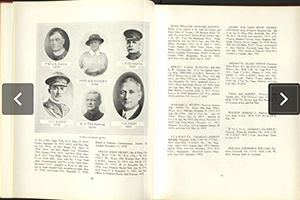 |
The War Memorial2022 marked 100 years since the publication of The War Memorial Volume of Trinity College, Toronto. The 165 page volume is a meticulously researched artefact that demonstrates the wide-ranging effect the war had on the wider college community. As time passes and we become further and further removed from the events and horrors of the World Wars, documents like The War Memorial Volume illustrate the real-world impact conflicts can have on a community like Trinity College. Simultaneously, it also shows the out-sized impact Trinity College had on the war effort. Learn more about this volume. Image: Pages from the The War Memorial Volume of Trinity College, Toronto
|
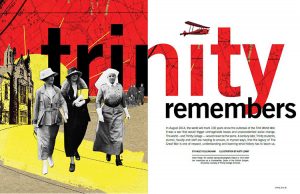 |
Remembering the Great WarIn August 2014, the world marked 100 years since the outbreak of the First World War. A total of 543 Trinity men travelled abroad to fight, joined by women of St. Hilda’s, who served as physicians, nurses, ambulance drivers and administrators. Of the 543 Trinity men who went to war 57 never returned —56 were killed in action, and one was missing. Read the full story: Remembering the Great War, Trinity Magazine, Spring 2014, pages 18-25 (PDF 1.68MB). Image: Trinity looks back as we mark the 100th anniversary of the start of The Great War – article.
|
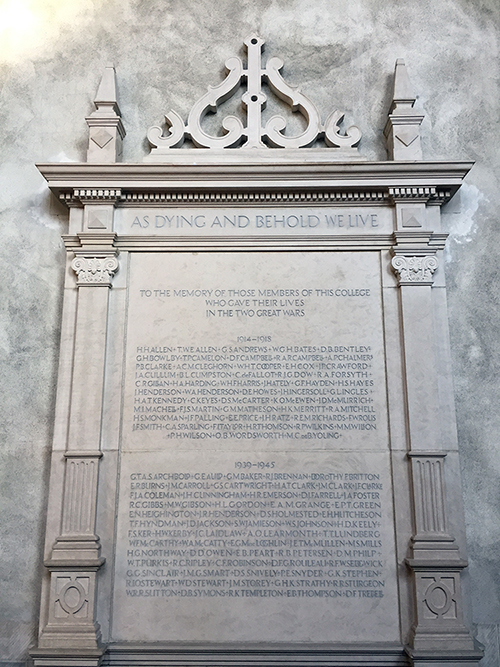
|
As Dying and Behold We LiveImage: To the memory of those members of Trinity College who gave their lives in the two Great Wars. The names of those who never returned home are engraved on the memorial wall in the Trinity College Chapel.
|
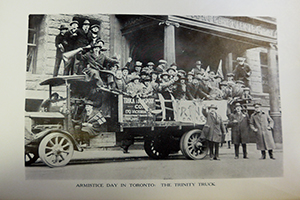 |
Trinity and The Great War 1914-1918In 2017, many of the devastating battles of the Great War reached their centenaries, including Vimy Ridge, Passchendaele and the Third Battle of Ypres. To commemorate the sacrifices of the Trinity community, an exhibit capturing some of the narratives of the Great War was on display in the Trinity College Archives: “Trinity at War: 1914-1918.” Image: The Trinity Truck – Students from the College celebrate the Armistice on November 11, 1918 in the Trinity Truck. The caption reads: “When the word came that Peace had been signed, Charles Gossage rented a truck, all the students of Trinity piled into it and they drove all over Toronto.”
|
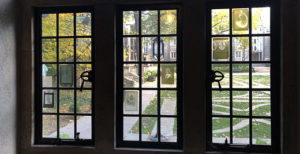 |
Trinity and St. Hilda’s in the Great WarToronto Star coverage of our exhibit ‘Trinity and St. Hilda’s in the Great War’ (November 2018): First World War soldiers and nurses are a ghostly presence in Trinity College windows. The Trinity College Archives holds 210 glass plate negatives of portraits of the young people who left their studies or their careers, and went to war. Some of these images were reproduced for an exhibit in 2018. Image: Portrait reproduction of glass plate negatives displayed on windows along the main hallway.
|
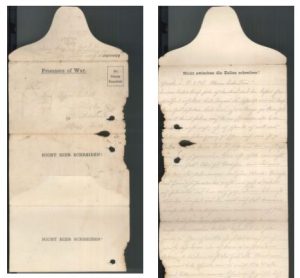
|
Rare Book of the Month 2018World War I Pow Letter, John W. Graham Library Blog, November 2018 Image: Letter from Emil Seebaldt, prisoner of war, to his wife Agnes Seebaldt in 1917.
|
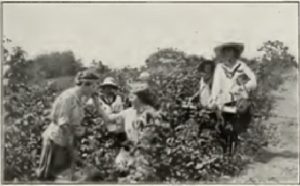 |
Farmerettes Help at HomeLearn how U of T’s women undergrads – including Trinity’s Mossie Waddington – aided the WW1 effort at home: Changed by War: Farmerettes Help at Home in U of T Magazine. In 1917 and 1918 hundreds of U of T women spent the summers picking and packing fruits and vegetables, filling in for farmers who were away at war. Image: U of T women spent the summers filling in for farmers who were away at war.
|
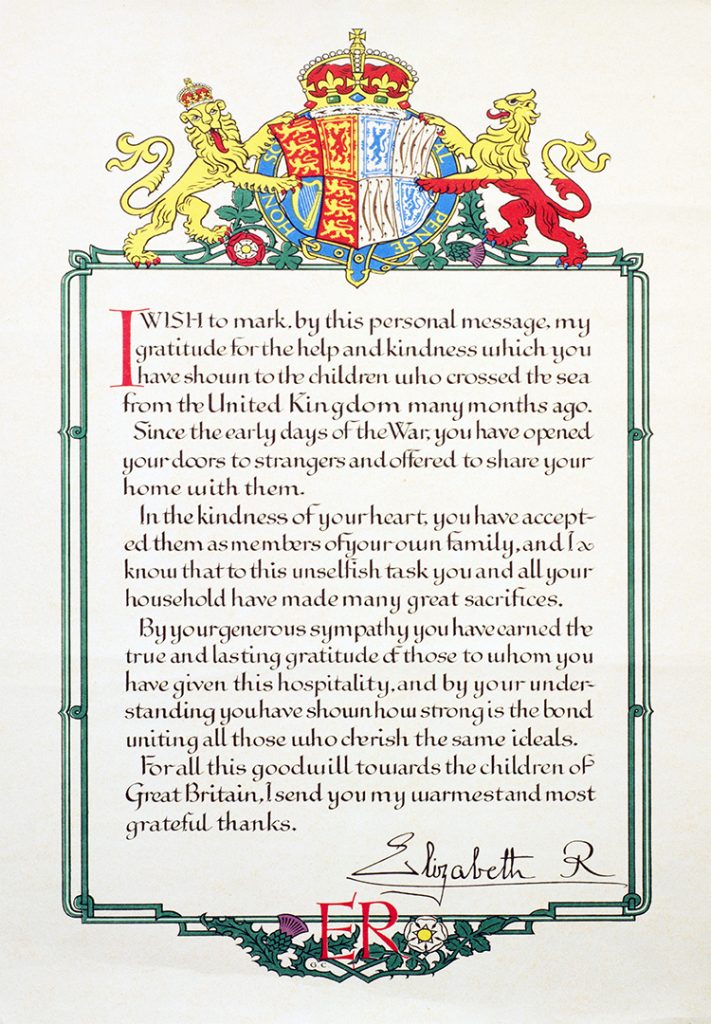
|
Trinity Welcomes 150 Children from War-Torn Great BritainFrom July 1940 to November 1944, the Trinity community welcomed over 150 children from St. Hilda’s School in Whitby, England. Evacuated from war-torn Great Britain, they were housed and educated thanks to Trinity’s Provost Francis Cosgrave and the Saint Hilda’s College Alumnae Association. A beautiful letter from Queen Elizabeth recognizes these efforts by the Trinity community. Image: A beautiful letter from Queen Elizabeth recognizes these efforts by the Trinity community.
|
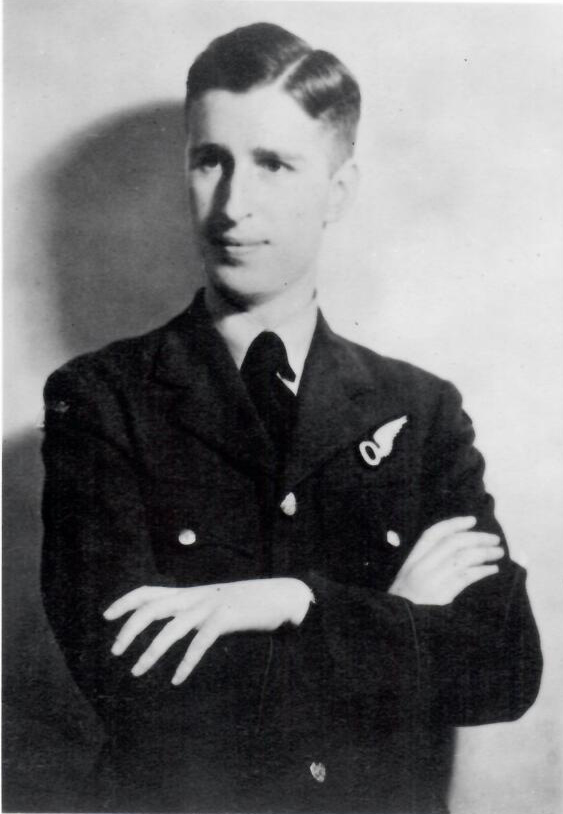
|
The story of Jacques Olivier Clerc, 1917-1944by Sylvia Lassam, Rolph-Bell Archivist On the day after war was declared in 1939 a young Swiss academic arrived at the University of Toronto to teach in the Department of Political Economy.
|
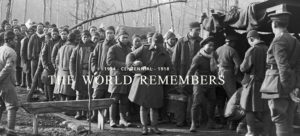 |
The World RemembersTo mark the 1914-1918 Centennial, Trinity College was honoured to participate in The World Remembers, a unique Canadian and international remembrance to honour those who died in the First World War.
|
Categories: Alumni; College News; Discover Trinity; Events


